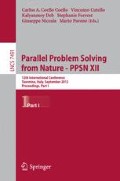Abstract
We contribute to the theoretical understanding of variable length evolutionary algorithms. Such algorithms are very flexible but can encounter the bloat problem which means solutions grow during the optimization run without providing additional benefit. We explore two common mechanisms for dealing with this problem from a theoretical point of view and point out the differences of a parsimony and a multi-objective approach in a rigorous way. As an example to point out the differences, we consider different measures of sortedness for the classical sorting problem which has already been studied in the computational complexity analysis of evolutionary algorithms with fixed length representations.
Access this chapter
Tax calculation will be finalised at checkout
Purchases are for personal use only
Preview
Unable to display preview. Download preview PDF.
References
Auger, A., Doerr, B. (eds.): Theory of Randomized Search Heuristics: Foundations and Recent Developments. World Scientific (2011)
Cathabard, S., Lehre, P.K., Yao, X.: Non-uniform mutation rates for problems with unknown solution lengths. In: FOGA, pp. 173–180. ACM, New York (2011)
Durrett, G., Neumann, F., O’Reilly, U.-M.: Computational complexity analysis of simple genetic programing on two problems modeling isolated program semantics. In: FOGA, pp. 69–80. ACM (2011)
Friedrich, T., He, J., Hebbinghaus, N., Neumann, F., Witt, C.: Approximating covering problems by randomized search heuristics using multiobjective models. Evolutionary Computation 18(4), 617–633 (2010)
Giel, O., Lehre, P.K.: On the effect of populations in evolutionary multiobjective optimisation. Evolutionary Computation 18(3), 335–356 (2010)
Kötzing, T., Sutton, A., Neumann, F., O’Reilly, U.-M.: The Max problem revisited: the importance of mutation in genetic programming. In: GECCO (to appear, 2012)
Koza, J.R.: Genetic Programming: On the Programming of Computers by Means of Natural Selection. MIT Press, Cambridge (1992)
Laumanns, M., Thiele, L., Zitzler, E.: Running time analysis of multiobjective evolutionary algorithms on pseudo-boolean functions. IEEE Trans. Evolutionary Computation 8(2), 170–182 (2004)
Neumann, F.: Computational complexity analysis of multi-objective genetic programming. In: GECCO (to appear, 2012), http://arxiv.org/abs/1203.4881
Neumann, F., Wegener, I.: Minimum spanning trees made easier via multi-objective optimization. In: GECCO, pp. 763–770. ACM Press (2005)
Neumann, F., Witt, C.: Bioinspired Computation in Combinatorial Optimization – Algorithms and Their Computational Complexity. Springer (2010)
Scharnow, J., Tinnefeld, K., Wegener, I.: The analysis of evolutionary algorithms on sorting and shortest paths problems. Journal of Mathematical Modelling and Algorithms 3, 349–366 (2004)
Shukla, P.K., Deb, K.: On finding multiple Pareto-optimal solutions using classical and evolutionary generating methods. European Journal of Operational Research 181(3), 1630–1652 (2007)
Urli, T., Wagner, M., Neumann, F.: Experimental Supplements to the Computational Complexity Analysis of Genetic Programming for Problems Modelling Isolated Program Semantics. In: Coello Coello, C.A., et al. (eds.) PPSN 2012, Part I. LNCS, vol. 7491, pp. 102–112. Springer, Heidelberg (2012)
Wegener, I.: Methods for the analysis of evolutionary algorithms on pseudo-boolean functions. In: Evolutionary Optimization. International Series in Operations Research and Management Science, vol. 48, pp. 349–369. Springer, US (2003)
Author information
Authors and Affiliations
Editor information
Editors and Affiliations
Rights and permissions
Copyright information
© 2012 Springer-Verlag Berlin Heidelberg
About this paper
Cite this paper
Wagner, M., Neumann, F. (2012). Parsimony Pressure versus Multi-objective Optimization for Variable Length Representations. In: Coello, C.A.C., Cutello, V., Deb, K., Forrest, S., Nicosia, G., Pavone, M. (eds) Parallel Problem Solving from Nature - PPSN XII. PPSN 2012. Lecture Notes in Computer Science, vol 7491. Springer, Berlin, Heidelberg. https://doi.org/10.1007/978-3-642-32937-1_14
Download citation
DOI: https://doi.org/10.1007/978-3-642-32937-1_14
Publisher Name: Springer, Berlin, Heidelberg
Print ISBN: 978-3-642-32936-4
Online ISBN: 978-3-642-32937-1
eBook Packages: Computer ScienceComputer Science (R0)

